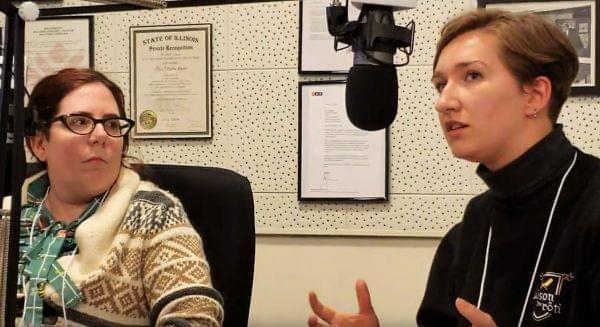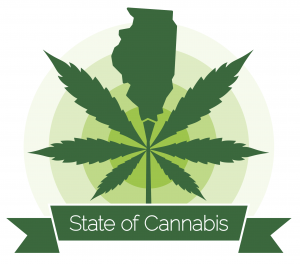More Questions Loom In The ‘State Of Cannabis’

Steph Whiteside and Sarah Jesmer discuss the questions they still have regarding cannabis in Illinois. Susan Stephens/WNIJ
You've heard a series of reports on the potential expansion of Cannabis in Illinois.
For WNIJ reporter Sarah Jesmer, her reporting created more questions than answers.

This story is part of a week-long series from public radio stations around the state focusing on the potential impact of marijuana legalization.
“I still have questions about why it's taken so long to have such intense discussions about legalization, whether for or against,” Jesmer said. “The Cannabis Control Act [known as the Controlled Substances Act] passed in the 70s. And it's now 2019. I'm interested to see personally how the criminal justice side will be handled on the state level.”
For Steph Whiteside with WSIU/Illinois Newsroom, the lingering questions around healthcare come from a lack of data.
“I do know that it's being collected,” Whiteside said. “So what are the conditions people are trying to treat? And what research do we have?”
Whiteside also wonders what it will take to get doctors to talk more openly, especially as medical marijuana is a leading alternative to prescribed opioids.
“How do we make it easier for patients to connect with a doctor who is willing to certify them for medical marijuana?” Whiteside said. “Who is willing to have those conversations? And how do we protect those doctors from fears about losing funding or having their license impacted?”

Ryan Denham of WGLT-FM in Normal.
Reporter Ryan Denham with WGLT in Bloomington/Normal says he’s curious to learn more about the permanence of the economic impact of potentially legalizing [recreational] marijuana.
“23,000 new jobs might be created and 2,600 new businesses will be created around the state,” Denham noted. “But those projections are in a vacuum. What if Indiana, Wisconsin, Missouri, Kentucky--what if everybody legalizes over the next 10-20 years? What if something happens federally that makes that whole issue moot? That what happens to the economic impact questions?”
APPLES TO APPLES
Steph Whiteside says when it comes to the medical side of the debate, it’s important to make fair comparisons.
“If you are talking about medical use, you're not weighing somebody who's using marijuana against what might be happening to their body if they're using nothing,” Whiteside said. “You're weighing marijuana against other medications that have very strong side effects in many ways.”
Whiteside says doctors she has heard from are very much in favor of regulation.
“There's actually a lot of people talking about if we should regulate edibles,” Whiteside said. “In particular because they appeal to children. If you've ever purchased an edible from a dispensary or you've seen one-- it's a brownie, it's a gummy, or it's a candy bar. So it was interesting how strongly people were speaking out about if we're if this is medicine, we need to treat it like medicine and not disguise it as a treat.”
Jesmer says it’s a very speculative phase and everyone is trying to figure out what it could mean for their lives.
“I think that it comes with the birth of a whole lot of new policies,” Jesmer said. “That can be found in markets, law enforcement, and in the way that you interact with your doctor.”
"State Of Cannabis" is an Illinois Public Radio collaboration.

